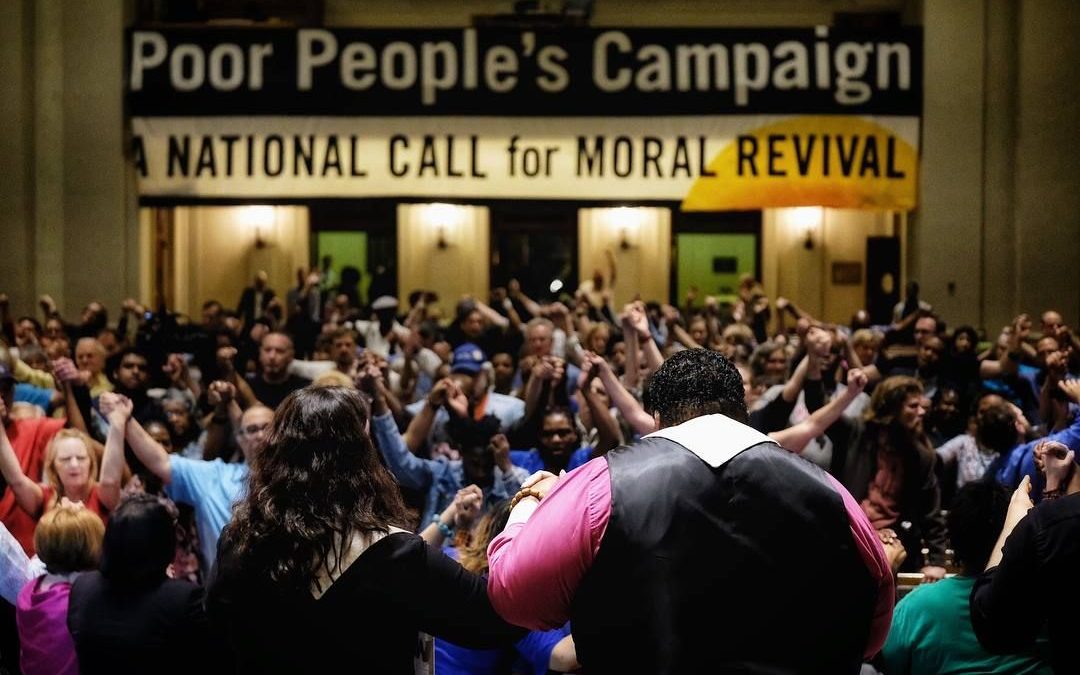55 years ago, in 1968, Rev. Dr. Martin Luther King, Jr., and other civil rights leaders launched a Poor People’s Campaign to tackle what he called the “Triplets of Evil” — systemic racism, poverty, and militarism. Fifty years later, activists revived that multi-racial fusion movement to carry on the fight against these injustices, as well as the growing scourge of ecological devastation.
Since 2018, the Institute for Policy Studies has proudly served as the research arm of the modern-day Poor People’s Campaign. Our joint 2018 “Souls of Poor Folks” audit took a deep dive into shocking statistics on the uphill battles our communities face, from voting rights to mass incarceration to wealth inequality, and found that these systemic problems had significantly deepened since 1968.
In 2023, once again, the Poor People’s Campaign, Kairos Center, Repairers of the Breach, and the Institute for Policy Studies are taking stock with the release of new, updated fact sheets that examine the state of poverty and inequality at the national level in the United States, as well as extensive data for each of the 50 states and D.C.
Each fact sheet is highlighted below.
Key fact sheet highlights include:
- Pandemic relief policies temporarily lifted the load of poverty, proving that poverty in the richest country in the world is a policy choice. But these initiatives ended too soon, resulting in higher rates of economic, food, and housing insecurity.
- Our most recent data indicate that poor and low-income people make up more than 40 percent of the population in 13 states: California, Mississippi, New Mexico, Florida, Hawaii, New York, Georgia, Alaska, Louisiana, Texas, Nevada, Arkansas, and North Carolina.
- With rising inflation, average household debt rose in every state between the last quarters of 2021 and 2022, with a third of all states now having average debt burdens of $50,000 or more.
- The lifting of pandemic eviction protections in 2021 put as many as 17 million people at risk of becoming unhoused. As of the beginning of 2023, 7 million households nationwide reported being behind in their rent or mortgage payments. In nearly a third of states, at least 100,000 families were behind on these bills.
- The end of pandemic policies that expanded Medicaid access is putting millions of Americans at risk of losing their health care, including over 5 million children, 6.6 million white people, 4.6 million Hispanic/Latino people, 2.2 million Black people, and over 500,000 Asian and Native people.
- Extreme heat, storms, and drought are becoming more common, with poor and low-income communities at greatest risk. As a share of their income, poor and low-income households are spending at least 5 times as much on energy costs as average households in all but two U.S. states (Washington and Connecticut).
- The fact sheets reveal the number of each state’s resident billionaires, a class of Americans extremely adept at avoiding their fair share of taxes. Georgia, for example, has 88 billionaires while 42.5 percent of the state’s population is poor or low-income.
- The fact sheets also include data on taxpayer dollars in each state that are being siphoned from human needs to further bloat our military budget, border control, and prison system. What Alabama taxpayers spent on nuclear weapons alone, for example, could cover Medicaid costs of 171,573 children in the state.
- Finally, the fact sheets also track threats to democracy in each state — from attacks on voting rights and civil rights to laws targeting the LGBTQ population for discrimination. For example, since 2020, over 1,000 voter suppression bills have been introduced in states around the country, 80 of which have been enacted into law.
Below you can find large print summaries of each state fact sheet, as well as the full fact sheet pamphlets for each state.
